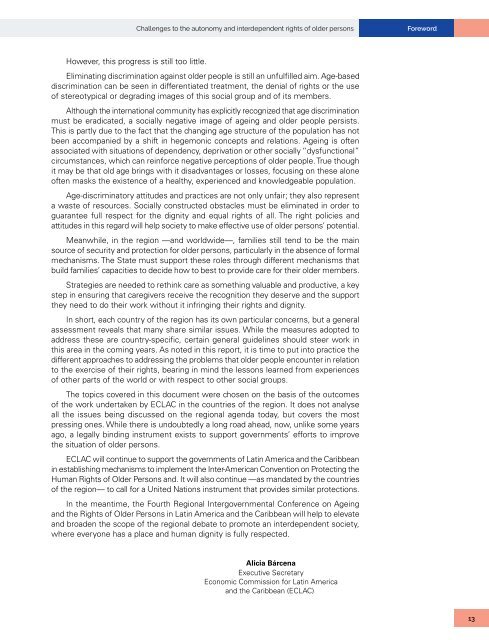Challenges to the autonomy and interdependent rights of older persons
Rapid population ageing in Latin America and the Caribbean brings multiple challenges and requires action to ensure the fair distribution of resources to meet the needs of all age groups in society. It also requires a change in attitudes, policies and practices to improve older persons’ quality of life. In this regard, the effective inclusion of older persons has to do with equitable access to different services and social and economic benefits, as well as the guarantee of their human rights.
Rapid population ageing in Latin America and the Caribbean brings multiple challenges and requires action to ensure the fair distribution of resources to meet the needs of all age groups in society. It also requires a change in attitudes, policies and practices to improve older persons’ quality of life. In this regard, the effective inclusion of older persons has to do with equitable access to different services and social and economic benefits, as well as the guarantee of their human rights.
Create successful ePaper yourself
Turn your PDF publications into a flip-book with our unique Google optimized e-Paper software.
<strong>Challenges</strong> <strong>to</strong> <strong>the</strong> au<strong>to</strong>nomy <strong>and</strong> <strong>interdependent</strong> <strong>rights</strong> <strong>of</strong> <strong>older</strong> <strong>persons</strong><br />
Foreword Capítulo I<br />
However, this progress is still <strong>to</strong>o little.<br />
Eliminating discrimination against <strong>older</strong> people is still an unfulfilled aim. Age-based<br />
discrimination can be seen in differentiated treatment, <strong>the</strong> denial <strong>of</strong> <strong>rights</strong> or <strong>the</strong> use<br />
<strong>of</strong> stereotypical or degrading images <strong>of</strong> this social group <strong>and</strong> <strong>of</strong> its members.<br />
Although <strong>the</strong> international community has explicitly recognized that age discrimination<br />
must be eradicated, a socially negative image <strong>of</strong> ageing <strong>and</strong> <strong>older</strong> people persists.<br />
This is partly due <strong>to</strong> <strong>the</strong> fact that <strong>the</strong> changing age structure <strong>of</strong> <strong>the</strong> population has not<br />
been accompanied by a shift in hegemonic concepts <strong>and</strong> relations. Ageing is <strong>of</strong>ten<br />
associated with situations <strong>of</strong> dependency, deprivation or o<strong>the</strong>r socially “dysfunctional”<br />
circumstances, which can reinforce negative perceptions <strong>of</strong> <strong>older</strong> people. True though<br />
it may be that old age brings with it disadvantages or losses, focusing on <strong>the</strong>se alone<br />
<strong>of</strong>ten masks <strong>the</strong> existence <strong>of</strong> a healthy, experienced <strong>and</strong> knowledgeable population.<br />
Age-discrimina<strong>to</strong>ry attitudes <strong>and</strong> practices are not only unfair; <strong>the</strong>y also represent<br />
a waste <strong>of</strong> resources. Socially constructed obstacles must be eliminated in order <strong>to</strong><br />
guarantee full respect for <strong>the</strong> dignity <strong>and</strong> equal <strong>rights</strong> <strong>of</strong> all. The right policies <strong>and</strong><br />
attitudes in this regard will help society <strong>to</strong> make effective use <strong>of</strong> <strong>older</strong> <strong>persons</strong>’ potential.<br />
Meanwhile, in <strong>the</strong> region —<strong>and</strong> worldwide—, families still tend <strong>to</strong> be <strong>the</strong> main<br />
source <strong>of</strong> security <strong>and</strong> protection for <strong>older</strong> <strong>persons</strong>, particularly in <strong>the</strong> absence <strong>of</strong> formal<br />
mechanisms. The State must support <strong>the</strong>se roles through different mechanisms that<br />
build families’ capacities <strong>to</strong> decide how <strong>to</strong> best <strong>to</strong> provide care for <strong>the</strong>ir <strong>older</strong> members.<br />
Strategies are needed <strong>to</strong> rethink care as something valuable <strong>and</strong> productive, a key<br />
step in ensuring that caregivers receive <strong>the</strong> recognition <strong>the</strong>y deserve <strong>and</strong> <strong>the</strong> support<br />
<strong>the</strong>y need <strong>to</strong> do <strong>the</strong>ir work without it infringing <strong>the</strong>ir <strong>rights</strong> <strong>and</strong> dignity.<br />
In short, each country <strong>of</strong> <strong>the</strong> region has its own particular concerns, but a general<br />
assessment reveals that many share similar issues. While <strong>the</strong> measures adopted <strong>to</strong><br />
address <strong>the</strong>se are country-specific, certain general guidelines should steer work in<br />
this area in <strong>the</strong> coming years. As noted in this report, it is time <strong>to</strong> put in<strong>to</strong> practice <strong>the</strong><br />
different approaches <strong>to</strong> addressing <strong>the</strong> problems that <strong>older</strong> people encounter in relation<br />
<strong>to</strong> <strong>the</strong> exercise <strong>of</strong> <strong>the</strong>ir <strong>rights</strong>, bearing in mind <strong>the</strong> lessons learned from experiences<br />
<strong>of</strong> o<strong>the</strong>r parts <strong>of</strong> <strong>the</strong> world or with respect <strong>to</strong> o<strong>the</strong>r social groups.<br />
The <strong>to</strong>pics covered in this document were chosen on <strong>the</strong> basis <strong>of</strong> <strong>the</strong> outcomes<br />
<strong>of</strong> <strong>the</strong> work undertaken by ECLAC in <strong>the</strong> countries <strong>of</strong> <strong>the</strong> region. It does not analyse<br />
all <strong>the</strong> issues being discussed on <strong>the</strong> regional agenda <strong>to</strong>day, but covers <strong>the</strong> most<br />
pressing ones. While <strong>the</strong>re is undoubtedly a long road ahead, now, unlike some years<br />
ago, a legally binding instrument exists <strong>to</strong> support governments’ efforts <strong>to</strong> improve<br />
<strong>the</strong> situation <strong>of</strong> <strong>older</strong> <strong>persons</strong>.<br />
ECLAC will continue <strong>to</strong> support <strong>the</strong> governments <strong>of</strong> Latin America <strong>and</strong> <strong>the</strong> Caribbean<br />
in establishing mechanisms <strong>to</strong> implement <strong>the</strong> Inter-American Convention on Protecting <strong>the</strong><br />
Human Rights <strong>of</strong> Older Persons <strong>and</strong>. It will also continue —as m<strong>and</strong>ated by <strong>the</strong> countries<br />
<strong>of</strong> <strong>the</strong> region— <strong>to</strong> call for a United Nations instrument that provides similar protections.<br />
In <strong>the</strong> meantime, <strong>the</strong> Fourth Regional Intergovernmental Conference on Ageing<br />
<strong>and</strong> <strong>the</strong> Rights <strong>of</strong> Older Persons in Latin America <strong>and</strong> <strong>the</strong> Caribbean will help <strong>to</strong> elevate<br />
<strong>and</strong> broaden <strong>the</strong> scope <strong>of</strong> <strong>the</strong> regional debate <strong>to</strong> promote an <strong>interdependent</strong> society,<br />
where everyone has a place <strong>and</strong> human dignity is fully respected.<br />
Alicia Bárcena<br />
Executive Secretary<br />
Economic Commission for Latin America<br />
<strong>and</strong> <strong>the</strong> Caribbean (ECLAC)<br />
13


















